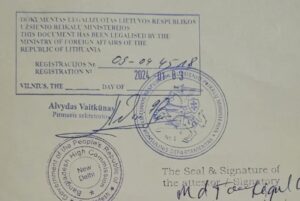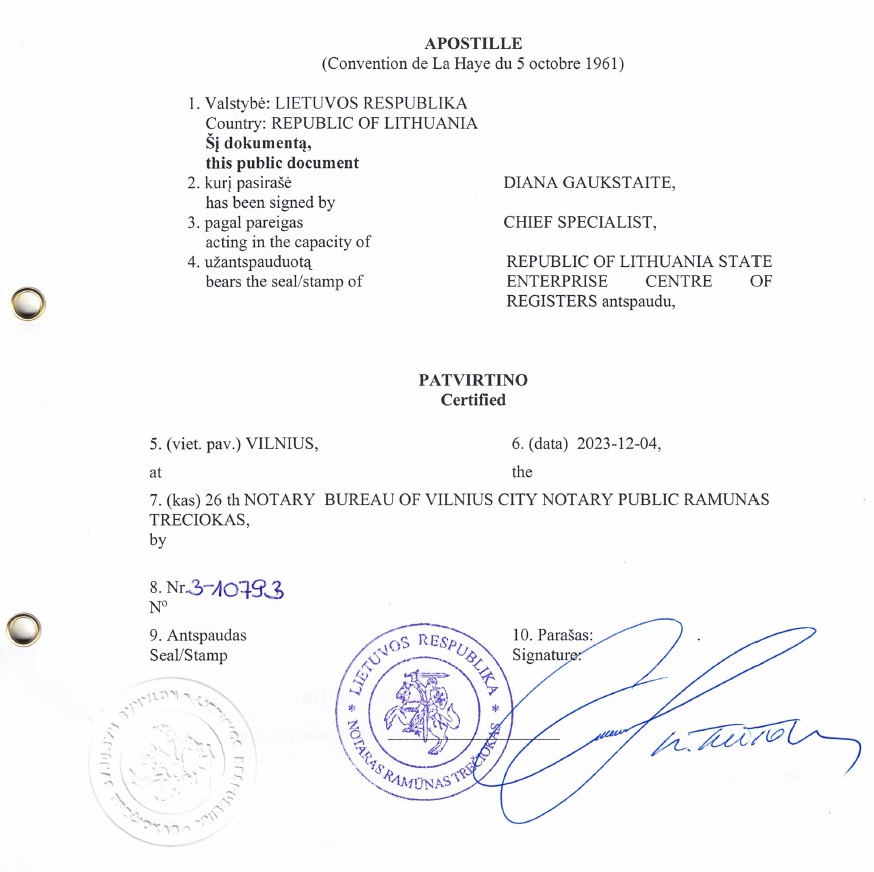Legalisation of documents in Lithuania
Updated: 2024-01-17
Legalization of documents is confirmation of the authenticity of the signature in the document, the duties of the signatory and the stamp. Legalization of documents is carried out at the Ministry of Foreign Affairs of the Republic of Lithuania and diplomatic missions or consular offices.
We help to legalize documents at the Ministry of Foreign Affairs of the Republic of Lithuania, so you can contact us if you need to legalize a document in Lithuania (police clearance certificate, marriage certificate and other documents) . You will send us document via courier and we will do the legalisation work for you. Contact us for the service.
Double legalisation
If the documents will be submitted in a foreign country that has not joined the 1961 Hague Conventions, they must be legalized. And if the documents are issued from a foreign country that has not joined the 1961 Hague Conventions, they must be legalized as well. If both countries are members of Hague convention, then only approval with apostille will be sufficient. Otherwise documents will have to get double legalization. Legalization of documents means double confirmation of the document – in the country that issued the document and in the country where the document will be presented.
In Lithuania you may use documents which are approved with apostille and you do not need to legalize it once again in Lithuania. Documents with apostille are approved in India, Pakistan and other countries. Full list of countries.

Document legalisation in Lithuania
Procedure of document legalisation
First of all, the document must be legalized at the Ministry of Foreign Affairs of the country that issued the document or at a diplomatic mission or consular office. After that, it must be legalized by the Ministry of Foreign Affairs of the country where it will be presented or by the diplomatic mission of that country.
Document approval with apostille
Confirmation of documents by apostille (Apostille) is confirmation of the authenticity of the signature in the document, the duties of the signatory and the seal with a special certificate provided for in 1961. October 5 The Hague Convention on the Abolition of Legalization of Documents Issued in Foreign Countries.
Apostille certification of documents is carried out in notaries’ offices.
A document legalization or confirmation apostille is needed for official documents issued in one country to be valid in another country.
Many countries in Europe and the world have joined the Hague Convention, so documents issued in these countries, certified by an apostille, will be valid and will be accepted in the official national institutions and institutions of other countries without any additional legalization. In this case, double legalization of documents is not required.

Lithuanian appostile approval
What kind of documents can be apostilled?
Only public documents (for example, birth certificates, diplomas, documents issued by a court, notary, etc.) can be apostilled, but not documents issued by private individuals or companies. If a document issued by a private person or company needs to be apostilled, a copy of the document must be certified by a notary, and the certified copy is apostilled. Another possibility is that a private person can formalize a document at a notary’s office, the authenticity of the signature and, if necessary, the content, is confirmed by a notary. If the document is notarized, it can be apostilled.
Examples of public documents:
- birth certificate
- marriage certificate
- death certificate
- migration service certificates
- police certificates
- certificates and documents of local authorities
- extracts from the population register, diplomas with attachments
- school leaving certificates
- pension certificates
- Documents issued by the Ministry of Social Security and Labor and its subordinate institutions
- Documents issued by the Bank of Lithuania
- Documents issued by the Central Securities Depository
- documents issued by courts and notaries
- documents issued by the prosecutor’s office and prisons
- notarized copies of documents
- documents issued by the land registry
- Documents issued by the Register of Companies
- Etc.
